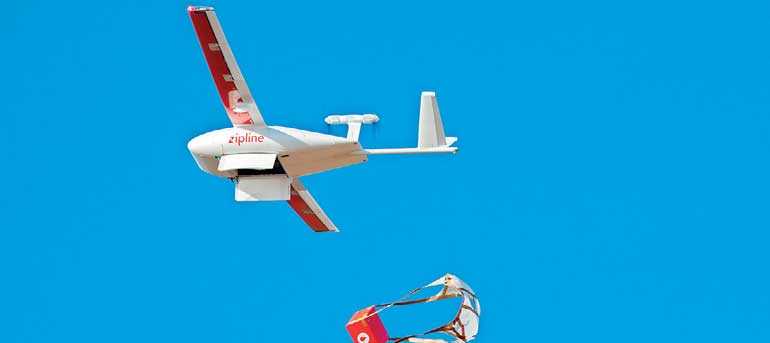Wednesday Feb 25, 2026
Wednesday Feb 25, 2026
Tuesday, 8 October 2019 00:00 - - {{hitsCtrl.values.hits}}

Access to vital health products in Sri Lanka and around the world is hampered by the last mile problem: the difficulty of matching the supply of medicine from central storage to the demand at urban and rural health facilities. All too often, people requiring lifesaving care do not get the medicine they need when they need it. This has been an imminent issue in Sri Lanka in the recent past with the annual flooding, landslides, and many unfortunate catastrophes.
“The need to accelerate the supply chain management vis-à-vis the traditional vehicles has been identified by many healthcare professionals. Despite Sri Lanka having one of the best healthcare systems in the region, there is the need to incorporate faster access to critical healthcare for all the citizens as and when they need it. This is essential during crisis situations where inventories that are available in hospitals are insufficient or unavailable,” stated Dr. Naveen Udawella, discussing the feasibility of implementing Zipline in Sri Lanka.
“At this juncture, Zipline is in conversation with the Ministry of Health, Civil Aviation Authority, Ministry of Defence, the President’s Office, and all other stakeholders from the Government on the possibility of implementing Zipline in Sri Lanka by 2020. In line with the local emergency protocols, Zipline will be fully monitored and tracked by the Ministry of Defence, and under the protocols of the Government, if the local government decided to proceed with the service,” said Zipline Global Business Development Lead Yaniv Gelnik.
Under such a context, India had taken the first steps to introduce life-saving medical delivery drones in Maharashtra. The Government of Maharashtra has partnered with Zipline, the world’s first and only national-scale drone delivery service, to use a logistics network of autonomous delivery drones to help transform emergency medicine and critical care in one of India’s most populous and dynamic states.
The revolutionary new service, which is expected to launch operations in early 2020, showcases to the other nations of the region – including Sri Lanka – the bold vision of the Government of Maharashtra in using drone delivery to establish universal, seven-days-a-week access to lifesaving and critical medicines for each of its 120 million citizens over the coming years.
Zipline drones will make on-demand and emergency deliveries of blood products, vaccines, and life-saving medications. As such, the Government of Maharashtra’s vision is for Zipline to establish a total of 10 distribution centres across Maharashtra in phases over the next several years. To increase access and reduce medical waste, key stock of blood products, vaccines and life-saving medications will be stored at Zipline’s distribution centres for just-in-time delivery. Health workers can place orders by text message or call and promptly receive their deliveries in 30 minutes on average.
Through the lifesaving medical drone delivery service, the delivery of such items can be arranged instantly when time is of the essence. It will help ensure that millions of people in critical situations have access to healthcare as soon as possible.
In the global context, in addition to Maharashtra, India, Zipline has already partnered with the governments of Ghana and Rwanda, where they are expected to help save tens of thousands of lives over the next several years. Zipline’s goal is to serve 700 million people in the next five years. The company is hard at work, catching up to demand to expand drone delivery services to developed and developing countries across Africa, South Asia, Southeast Asia, and the Americas, including the United States. Zipline is working with the US state of North Carolina to launch its medical drone delivery as a part of the US Federal Aviation Administration’s (FAA) UAS Integration Pilot Program (UASIPP) in 2019.